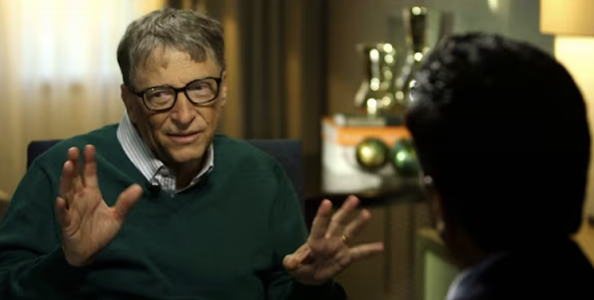Bill Gates shares a hopeful update in the fight against Alzheimer’s
By
Veronica E.
- Replies 0
Like many families, Bill Gates has experienced the heartbreak of watching a loved one fade due to Alzheimer’s disease.
In a recent essay, he reflected on the loss of his father, William H. Gates Sr., and the deeply personal impact it had on him.
But alongside the grief, Gates also shared a message of hope—one based on promising developments in early detection, treatment, and the momentum building around Alzheimer’s research.
As someone long committed to science and innovation, he now believes real change may be closer than many people realize.
And for millions of families touched by this disease, that hope matters.

Gates has been vocal about how Alzheimer’s is not just a public health challenge but a personal one.
More than 7 million Americans live with the disease today, including nearly 1 in 9 adults over 65.
Many families, like Gates’s, have faced the emotional and practical toll of care, confusion, and loss.
“We are closer than ever before to a world where no one has to watch someone they love suffer from this awful disease,” Gates wrote, emphasizing that this progress wouldn’t have been possible without continued support for research.
One of the most exciting breakthroughs Gates recently witnessed is a blood test that can detect Alzheimer’s long before symptoms begin.
This innovation, still in development, could offer a more affordable and accessible way to catch the disease early—up to 20 years before memory loss appears.
Right now, diagnosing Alzheimer’s typically requires expensive brain scans or spinal taps.
A simple blood test could make early screening part of a regular checkup—just like testing cholesterol or blood sugar.
That means earlier intervention, better care planning, and more time for families to respond before the disease progresses.
In addition to early detection, there’s been progress on the treatment front.
The FDA recently approved two new Alzheimer’s medications that, while not cures, can modestly slow the disease’s progression.
These drugs target amyloid plaques—protein buildups in the brain believed to play a key role in the disease.
Why this matters:
Gates sees this as a sign that the field is turning a corner: “These are just the first steps, but they are meaningful ones.”
Despite the optimism, Gates is concerned about one major threat to progress: declining public funding for research.
Large-scale studies, clinical trials, and drug development require federal support—something private donations alone can’t replace.
“If we pull back now, all this progress could grind to a halt,” Gates warned.
“No private initiative can fill that gap.”
He’s calling on policymakers and citizens alike to recognize the importance of maintaining research momentum.
For decades, Alzheimer’s has felt like an impossible challenge.
But Gates, along with researchers and advocates, believes the outlook is finally shifting. Here’s why:
Gates’s goal isn’t just scientific—it’s deeply personal. He imagines a future where:
“We are on the cusp of turning the tide against dementia,” he writes.
But he stresses that action must match hope if that vision is to become reality.
At The GrayVine, we believe in the power of science, compassion, and shared stories to drive progress.
The fight against Alzheimer’s is far from over, but with continued research, public support, and growing awareness, there’s real reason for hope.
As new tools and treatments emerge, families may soon have more options—and more time—with the people they love.
Read next: Unlock the secret of longevity: A neurosurgeon’s hearty recipe that fends off dementia

Has Alzheimer’s touched your life or the life of someone you love? What are your thoughts on these new developments or the need for more support?
We welcome your stories and questions in the comments below. Together, through shared experience and continued awareness, we can help move toward a future with better answers—and more hope.
In a recent essay, he reflected on the loss of his father, William H. Gates Sr., and the deeply personal impact it had on him.
But alongside the grief, Gates also shared a message of hope—one based on promising developments in early detection, treatment, and the momentum building around Alzheimer’s research.
As someone long committed to science and innovation, he now believes real change may be closer than many people realize.
And for millions of families touched by this disease, that hope matters.

Advances in Alzheimer’s research are offering new hope for early detection and treatment. Image Source: YouTube / BBC News.
A personal loss leads to public advocacy
Gates has been vocal about how Alzheimer’s is not just a public health challenge but a personal one.
More than 7 million Americans live with the disease today, including nearly 1 in 9 adults over 65.
Many families, like Gates’s, have faced the emotional and practical toll of care, confusion, and loss.
“We are closer than ever before to a world where no one has to watch someone they love suffer from this awful disease,” Gates wrote, emphasizing that this progress wouldn’t have been possible without continued support for research.
Also read: Unlock the secret early detector of Alzheimer’s: This simple DIY test could reveal clues in advance!
A promising step forward: A simple blood test
One of the most exciting breakthroughs Gates recently witnessed is a blood test that can detect Alzheimer’s long before symptoms begin.
This innovation, still in development, could offer a more affordable and accessible way to catch the disease early—up to 20 years before memory loss appears.
Right now, diagnosing Alzheimer’s typically requires expensive brain scans or spinal taps.
A simple blood test could make early screening part of a regular checkup—just like testing cholesterol or blood sugar.
That means earlier intervention, better care planning, and more time for families to respond before the disease progresses.
Also read: Brain health secrets: How to flush out "brain waste" and protect your mind
New treatments, growing momentum
In addition to early detection, there’s been progress on the treatment front.
The FDA recently approved two new Alzheimer’s medications that, while not cures, can modestly slow the disease’s progression.
These drugs target amyloid plaques—protein buildups in the brain believed to play a key role in the disease.
Why this matters:
- These treatments confirm that decades of research are starting to pay off.
- Success has attracted more investment and scientific interest in the field.
- Even small delays in symptoms can translate into more quality time for families.
Gates sees this as a sign that the field is turning a corner: “These are just the first steps, but they are meaningful ones.”
Also read: Bill Gates is giving away his ENTIRE fortune—Find out why he’s spending $200 billion.
A warning: Progress depends on continued support
Despite the optimism, Gates is concerned about one major threat to progress: declining public funding for research.
Large-scale studies, clinical trials, and drug development require federal support—something private donations alone can’t replace.
“If we pull back now, all this progress could grind to a halt,” Gates warned.
“No private initiative can fill that gap.”
He’s calling on policymakers and citizens alike to recognize the importance of maintaining research momentum.
Why this moment feels different
For decades, Alzheimer’s has felt like an impossible challenge.
But Gates, along with researchers and advocates, believes the outlook is finally shifting. Here’s why:
- Better tools: Advances in AI, genetics, and wearable health technology are improving how we detect and monitor brain health.
- Cultural change: Routine cognitive screening may become as common as a blood pressure check.
- Wider awareness: Global attention from caregivers, scientists, and leaders is keeping Alzheimer’s in the spotlight.
- Tangible progress: Breakthroughs are happening—not just in labs, but in patients’ lives.
Also read: This everyday speech habit might signal early Alzheimer’s–Are you at risk?
A vision for what’s next
Gates’s goal isn’t just scientific—it’s deeply personal. He imagines a future where:
- People can be diagnosed early and begin treatment while still healthy.
- New medications stop or slow progression before major decline.
- Research receives the steady funding it needs to bring lasting solutions.
“We are on the cusp of turning the tide against dementia,” he writes.
But he stresses that action must match hope if that vision is to become reality.
At The GrayVine, we believe in the power of science, compassion, and shared stories to drive progress.
The fight against Alzheimer’s is far from over, but with continued research, public support, and growing awareness, there’s real reason for hope.
As new tools and treatments emerge, families may soon have more options—and more time—with the people they love.
Read next: Unlock the secret of longevity: A neurosurgeon’s hearty recipe that fends off dementia
Key Takeaways
- Bill Gates, inspired by his father's experience with Alzheimer’s, has become an advocate for improved research and funding in the fight against the disease.
- A new blood test in development may help detect Alzheimer’s up to 20 years before symptoms begin, making early diagnosis more accessible and affordable.
- Two recently approved drugs can moderately slow Alzheimer’s progression, marking progress in treatment and boosting momentum for further research.
- Gates warns that cuts to public research funding could stall these advances, urging continued investment to maintain progress.
Has Alzheimer’s touched your life or the life of someone you love? What are your thoughts on these new developments or the need for more support?
We welcome your stories and questions in the comments below. Together, through shared experience and continued awareness, we can help move toward a future with better answers—and more hope.






